Ultimate Buyer's Guide to Motion vs Sunsama in 2024
Motion Vs Sunsama
24th Sep, 2024

Motion and Sunsama are very similar daily planner apps that can be used for busy individuals and for teams. Here's our comparisons to help you pick between them, which ones suit your needs, pricing breakdowns & more detailed tests.
Choosing between Motion & Sunsama?
One of the more challenging decisions is picking between these daily planner apps.
Many of these daily planner apps share many similarities but offer unique approaches to similar situations, so finding one that best suits your needs requires extensive research. That's where we can help. These tools aim to solve the same problem and balance your calendar and tasks together in one base with unique technologies.
Motion is much more of a scheduler's dream, while Sunsama tries to think about reducing mental overload at work. They are both similar in pricing, meaning many users find it hard to choose the right one if their budget isn't a factor.
Let's unpack all features, pricing, key differences & everything you need to know:
What will we cover in this overview?
To help you better navigate between Sunsama and Motion, here's what we plan to cover:
- What do Motion and Sunsama do?
- Understanding the key features that they both offer?
- What are the key differences between these two tools?
- How much do they cost, and how much should I pay?
- Final verdict & recommendations
How do we evaluate and test apps?
Tool Finder has been reviewing software for over 10+ years. Our team carefully reviews the tools, software, and apps featured here and provides valuable insights to help you decide which is best for you.
We've reviewed over 750+ apps and tools across the years and have a following on YouTube of over 415,000+ subscribers who rely on us to help them choose the perfect tool for them. These rules and regulations help us to establish the best reviews, insights & guides for you:
- We do not do paid reviews.
- We include affiliate links, but this doesn't affect our rankings.
- We recommend the best tools for the job and are trusted by you to do that.
What do they do?
Before you begin, let's better understand the pillars of choosing these applications. This might help you choose between them for the surface value they offer.
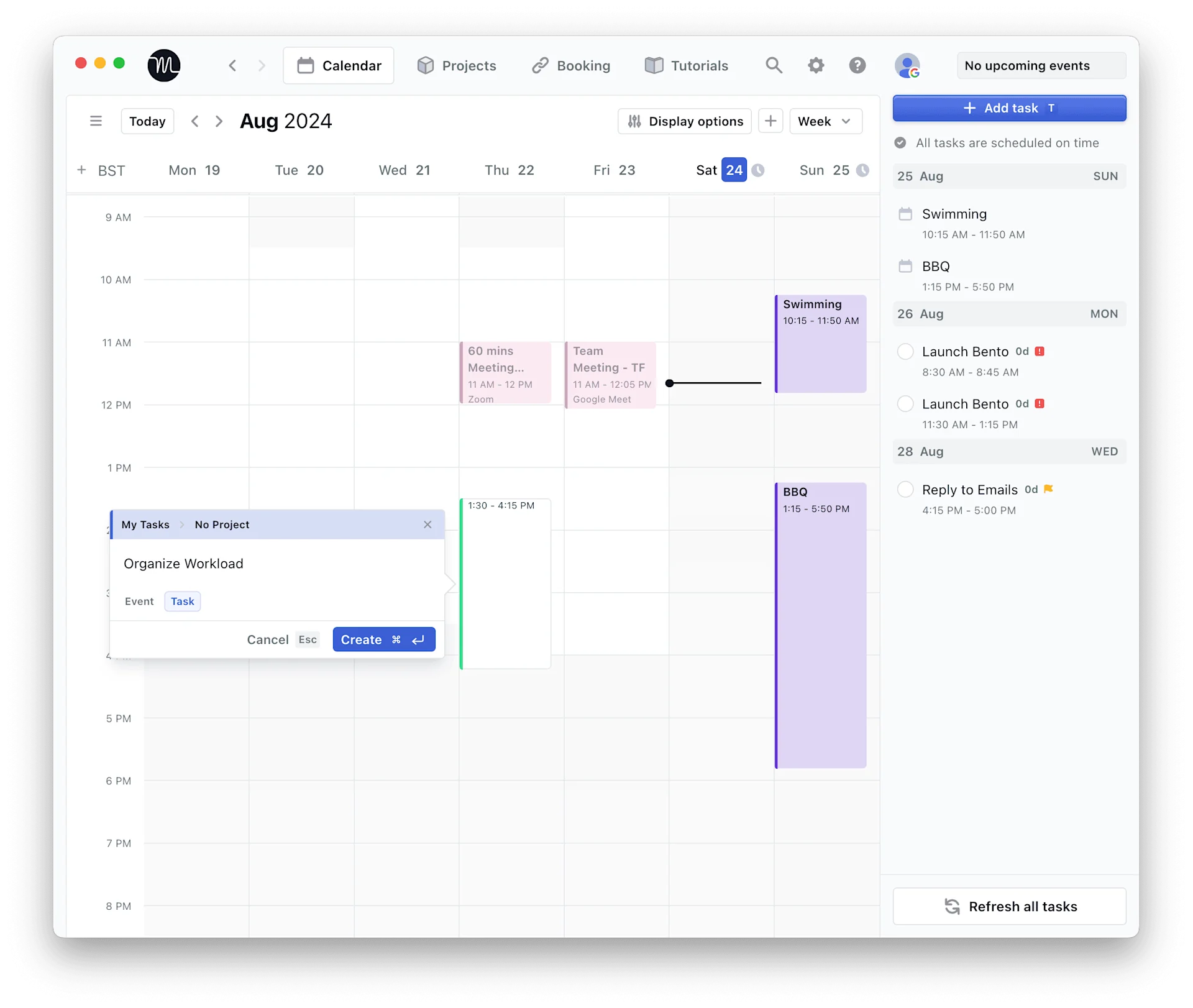
Motion
Motion is well known on the market as one of the fastest-growing to-do list applications. It combines calendar functionality, making it a daily planner application.
It also has team functionality, allowing you to collaborate with others. This makes it easier to manage projects in a small setting that up to 25 people may use.
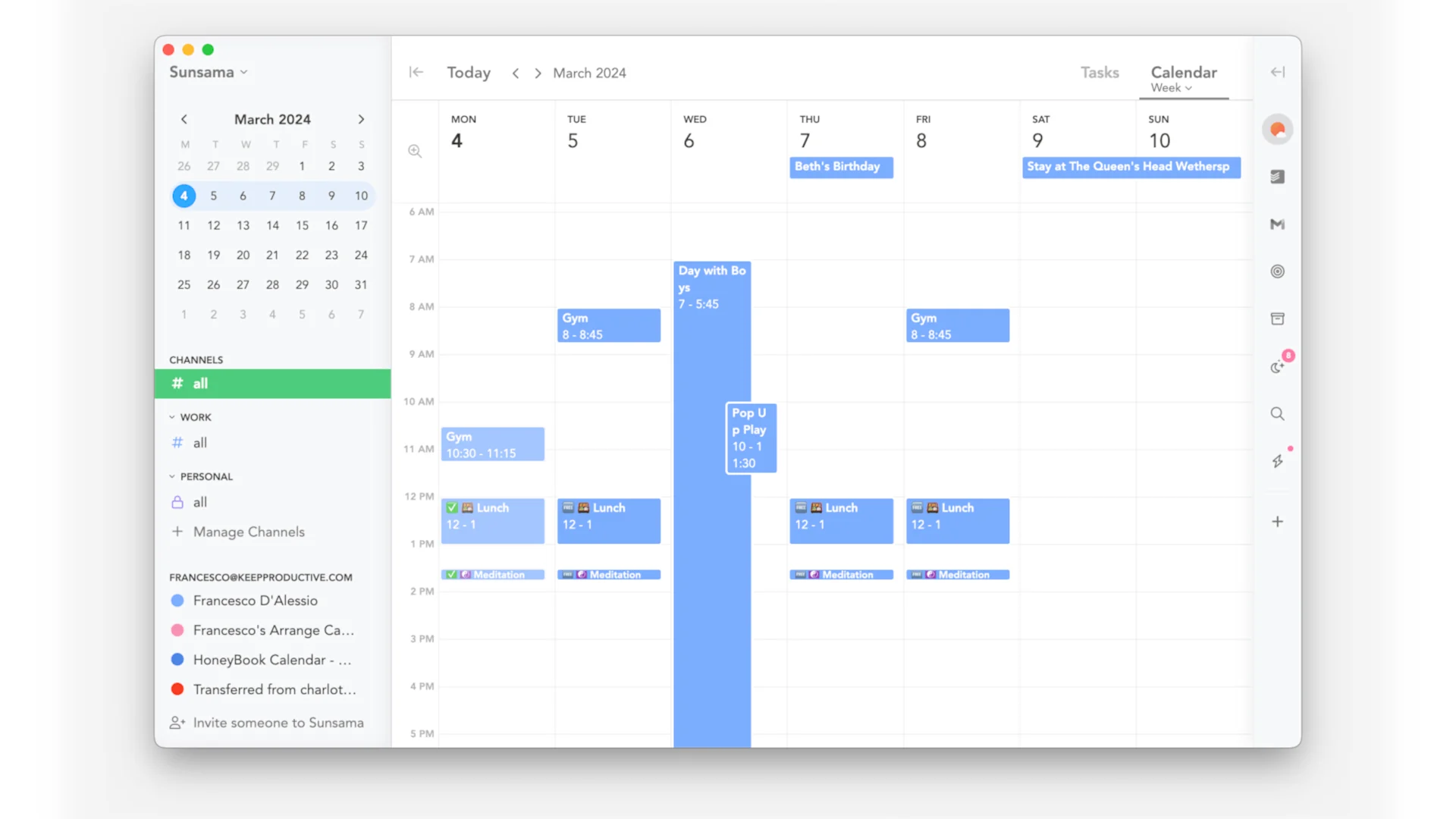
Sunsama
Sunsama, on the other hand, is a well-known application that has been in the market much longer than Motion. It has probably been one of the original daily planner applications. It does have some team functionality that allows others to collaborate on a project.
It also has something called task consolidation, which will enable you to bring all of your tasks from other project—or task-based applications into the same application, making it easier to manage it as a dashboard.
What is Motion App?
Motion is an AI-powered to-do list app for busy professionals. Motion allows you to manage your tasks and calendar and has project management abilities for small teams. It is available on iOS, Android, macOS, Windows, and the web. Many use Motion to auto-reschedule their tasks to reduce overwhelm.
Motion connects calendar management with Google Calendar (personal and work), Outlook Calendar, and iCloud Calendar, allowing you to see what's ahead for meetings alongside your tasks in real-time.
What is Sunsama?
Sunsama is a daily planner app that lets you organize your week ahead with tasks from other apps and calendar events from popular tools like Google Calendar.
It is available on desktop (macOS, Windows), iOS, and Android. It is very popular with busy professionals who want to manage their time with work-life balance as a focus.
Motion TLDR
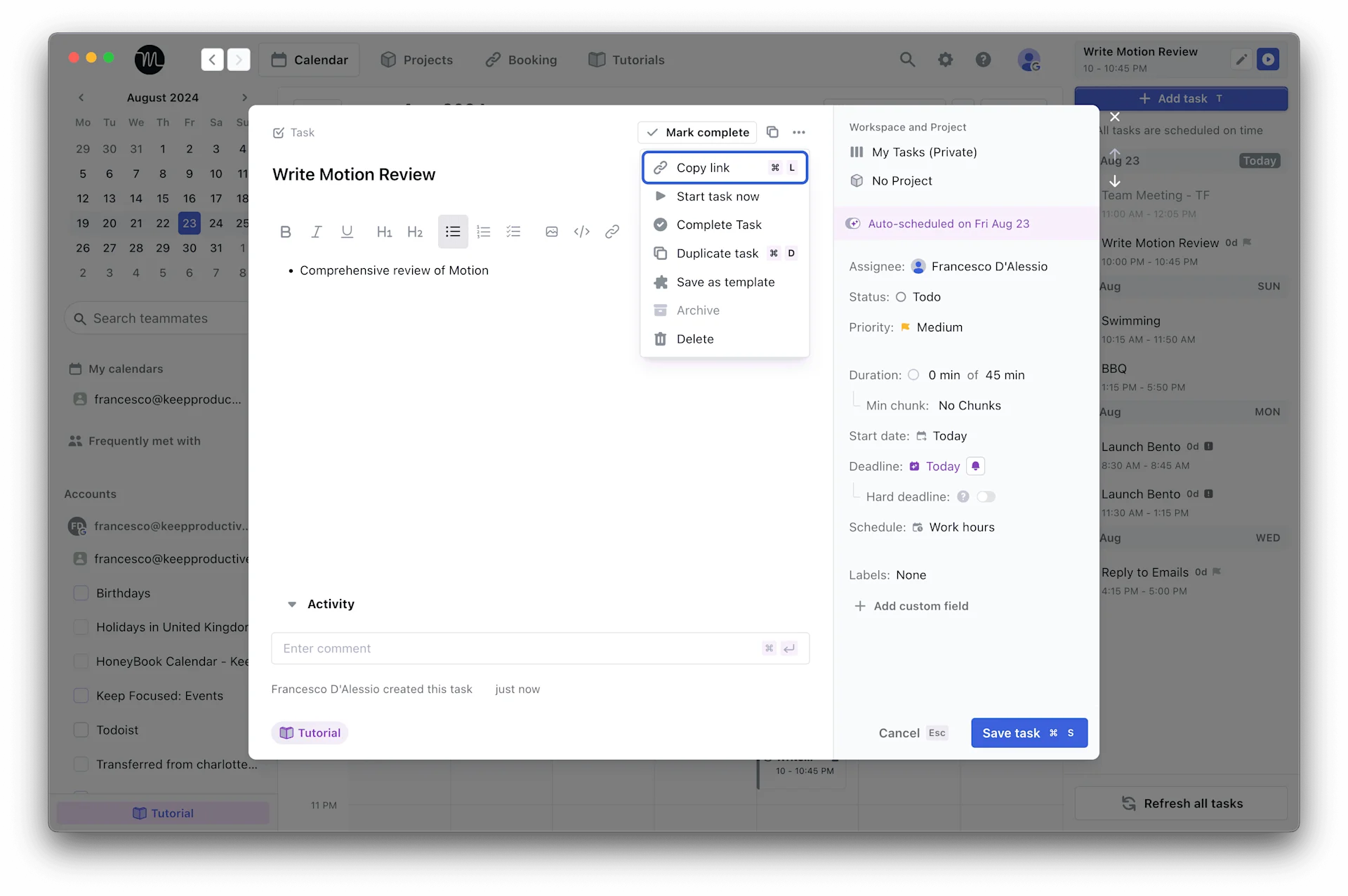
Motion focuses on bringing scheduling and AI to the front of their application, allowing you to reduce the need to micro-manage your schedule. This is helpful for those who want to reduce the act of productivity admin.
Sunsama TLDR
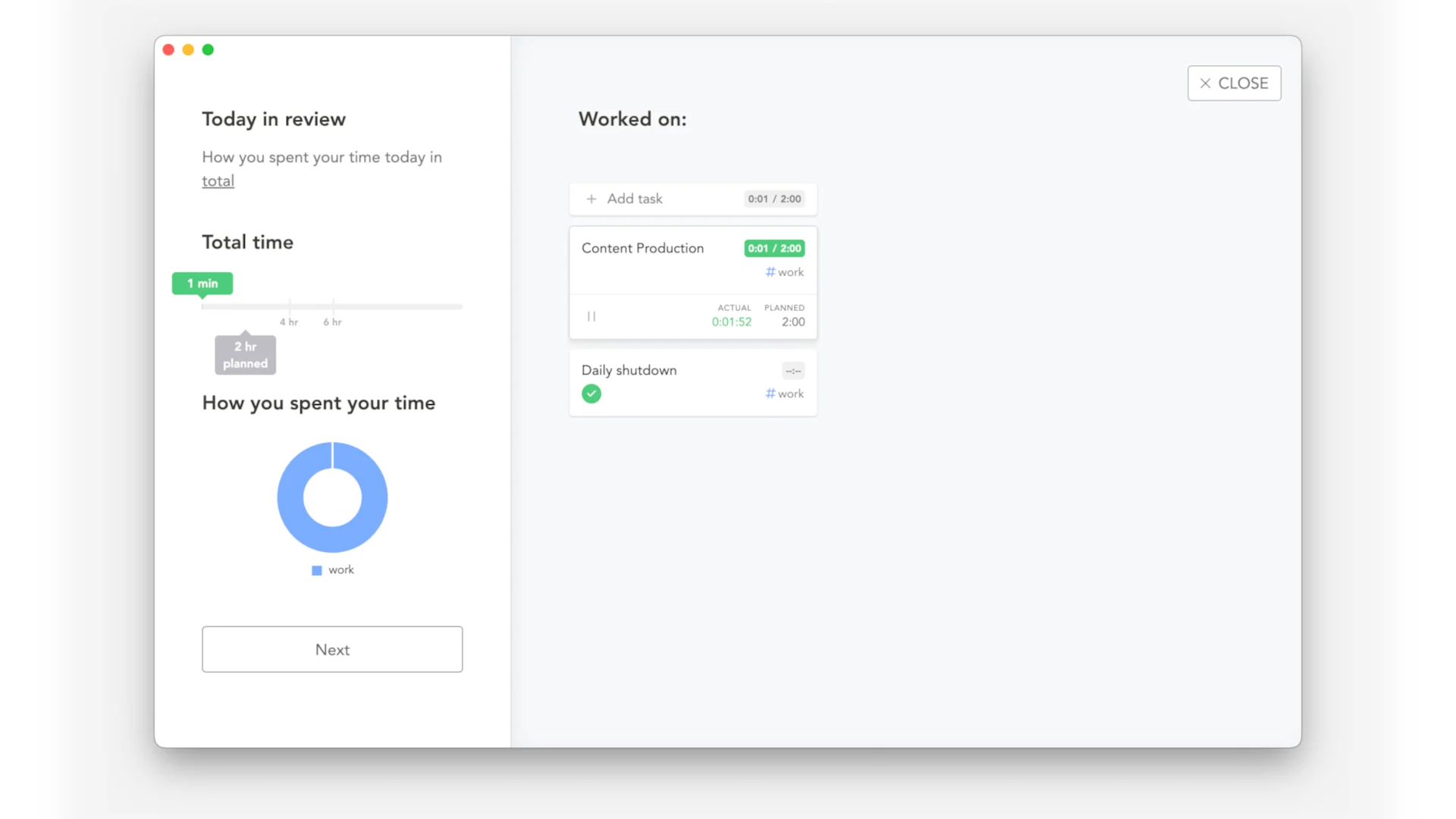
Sunsama wants to be more focused on guided planning, which, compared to Motion, is more of a mindfulness activity that should be embraced for managing your burnout and workload.
Features Compared
A side-by-side look at Sunsama and Motion's best features:
Sunsama | Motion | |
|---|---|---|
Guided Planning | Yes | No |
AI Scheduling | No | Yes |
Time Blocking | Yes | Yes |
Project Management | Limited | Yes |
Task Consolidation | Yes | No |
Focus Modes | Yes | No |
Timer | Yes | Yes |
Sunsama Features
Time to look at what features Sunsama has and whether they can be helpful:
Features | Good For? |
|---|---|
Task Management | Adding tasks and sub-tasks and organizing them into project labels can be done within Sunsama. You can see how many tasks you have, the amount per day, and whether doing them all will be possible on the typical working hours you have suggested to the app. This is a favorite feature amongst those who want a better work-life balance. |
Task Consolidation | Task consolidation means all your tasks in one place. You can add tasks from Notion, Trello, and around 15 other tools into Sunsama. This makes it the perfect place to manage all tasks in one. You can find the context needed to complete the task with a click, but the aim is to reduce the need to switch between apps. |
Guided Planning | One of Sunsama's brilliant features is guided planning, which allows you to plan your day and reflect on the one that has just been. This experience is great for those who want to be more mindful of tasks. It is one of the best planning experiences on the market, and it will allow you to think better about a plan for your week or even the day ahead. |
Week Objectives | Week planning is even more advanced. It allows you to set hierarchy goals for the week and feed amounts of time into your task list, making week goals more approachable. |
Focus Mode | Focus mode allows you to set a timer, zoom into your task, and add notes as you go to the task. This is perfect for keeping better and more accurate focus. The timer on the desktop shows outside of the app, which means you can see it anytime. |
Motion App Features
Let's unpack the core features and ratings of each feature:
Features | What does it do? | Quality |
|---|---|---|
Task Management | Motion offers task management for adding tasks, detailed priorities, deadlines, and more. It also comes with auto-scheduling, which operates the plan for your week ahead. | A |
Calendar Management | Connect Google, Outlook, and iCloud calendars to manage your incoming events. This helps you plan your tasks and calendar events in conjunction with each other. | B |
Project Management | Motion comes with lightweight project management abilities, not only for you but also sharing. This means you can assign tasks and organize them into Kanban boards or list views with many filters, sorting, and settings. | B+ |
AI Auto Scheduling | Task auto-scheduling is part of Motion and allows you to schedule any added task automatically. The more detail you add to the task—priority, deadline, importance, and value—the better the AI assistant will learn to plan future tasks. | A+ |
Meeting Scheduling | A comprehensive meeting scheduling system in Motion makes it easy to send a booking link or keep one active all the time. A decent settings area allows you to customize this further based on factors surrounding your other calendar and tasks. | B |
Key Differences between Sunsama and Motion
You'll have to break down what differs between these two daily planner apps a little more. This might be the most helpful section, as it might help you see what is valuable to you and your work.
Sunsama Differences
Better for Guided Planning
The most apparent benefit to Sunsama above Motion is the involvement of systems that help you guide your planning. This can be done at any time, during the workday, or at the end, allowing you to reflect.

This is also incorporated throughout the week, with weekly objectives as a feature and weekly reflection to assess how well your week went.
While AI doesn't automate this, it is automated each week to go off, allowing you to have a better and more reflective practice as part of your routine. For many, this embedding is an excellent approach to managing the task list forcedly (it can be turned off).
Better for Mindful Work Management
Throughout Sunsama, focusing on managing your workload is critical to reducing overload. This benefit is showcased in features where you can set working hours and get indications that you are overloading yourself with how much is added to your task list, a perfect way to keep focusing on quality, not quantity.
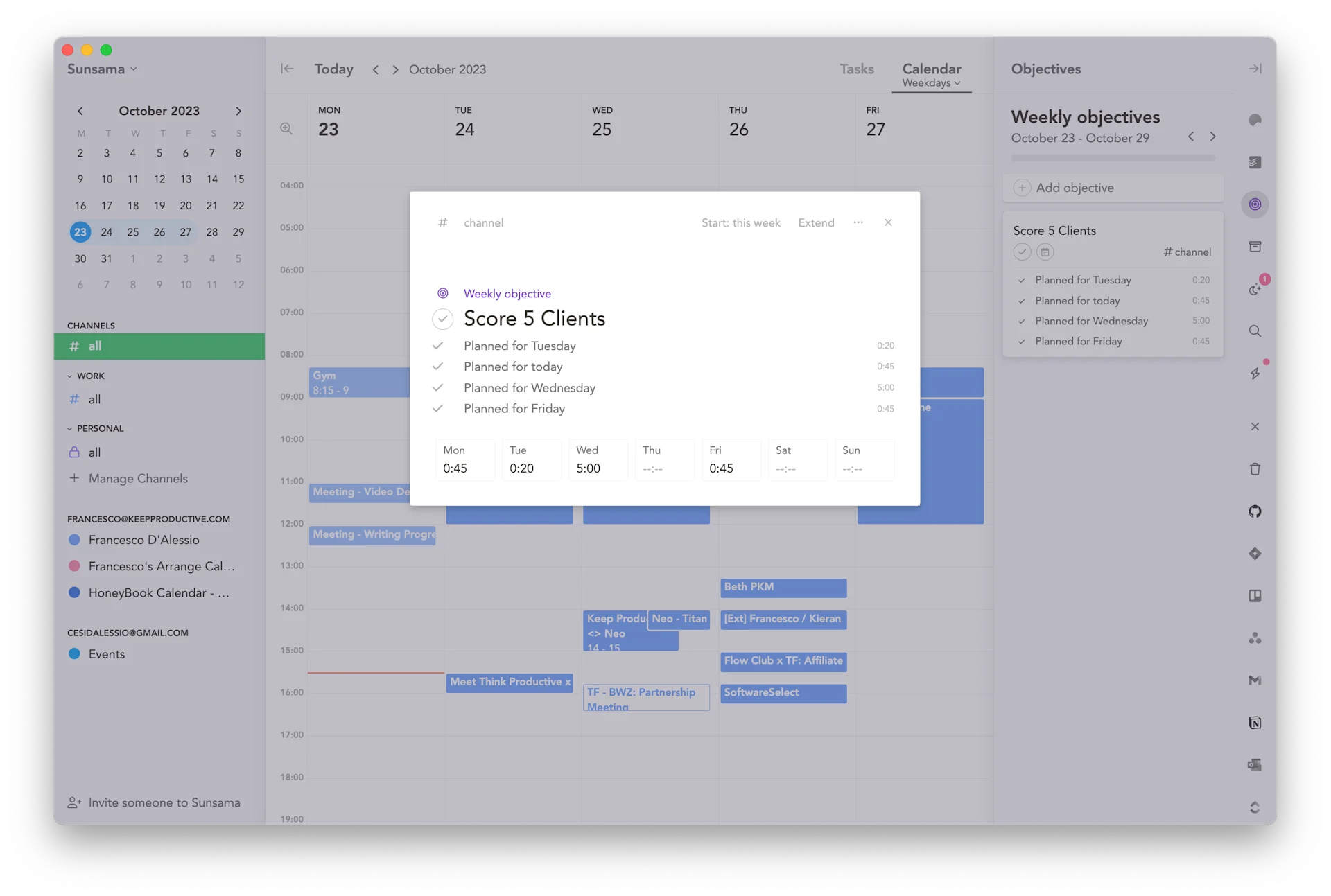
Thinking about what you do is breathed into Sunsama from the outset with features like the weekly objectives, which help you set a series of weekly tasks to filter down into your daily tasks and think about what matters.
Better Task Consolidation
Tasks can be managed in one place, which is something you cannot do inside Motion. This means you can quickly bring apps like Todoist and Gmail to your task list, among many more. This makes it a popular alternative to Akiflow, too.
Motion Differences
Better for AI Scheduling
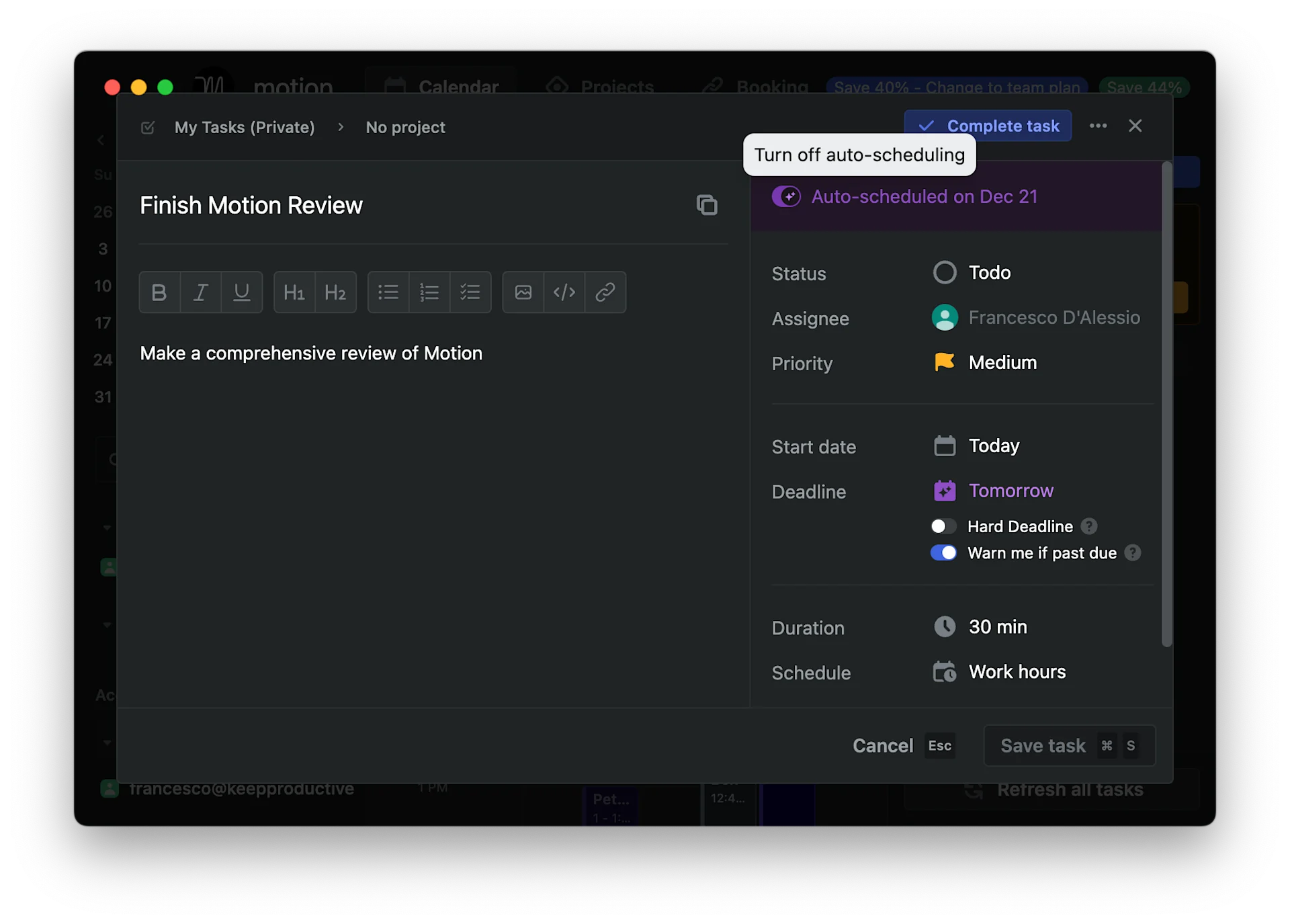
The motion does AI very well; you can add tasks, and the more detail you add, the more accurately it helps you weave your week ahead.
This is something Sunsama doesn't have, despite them adding the recent abilities, with AI project and time allocation, and even their existing auto-scheduling feature that doesn't live up to the more structural powers of managing your week with AI schedule.
Better for Project Management
Project management is much more robust in Motion than in Sunsama, giving those who want to plan with AI and schedule more effectively a better platform.
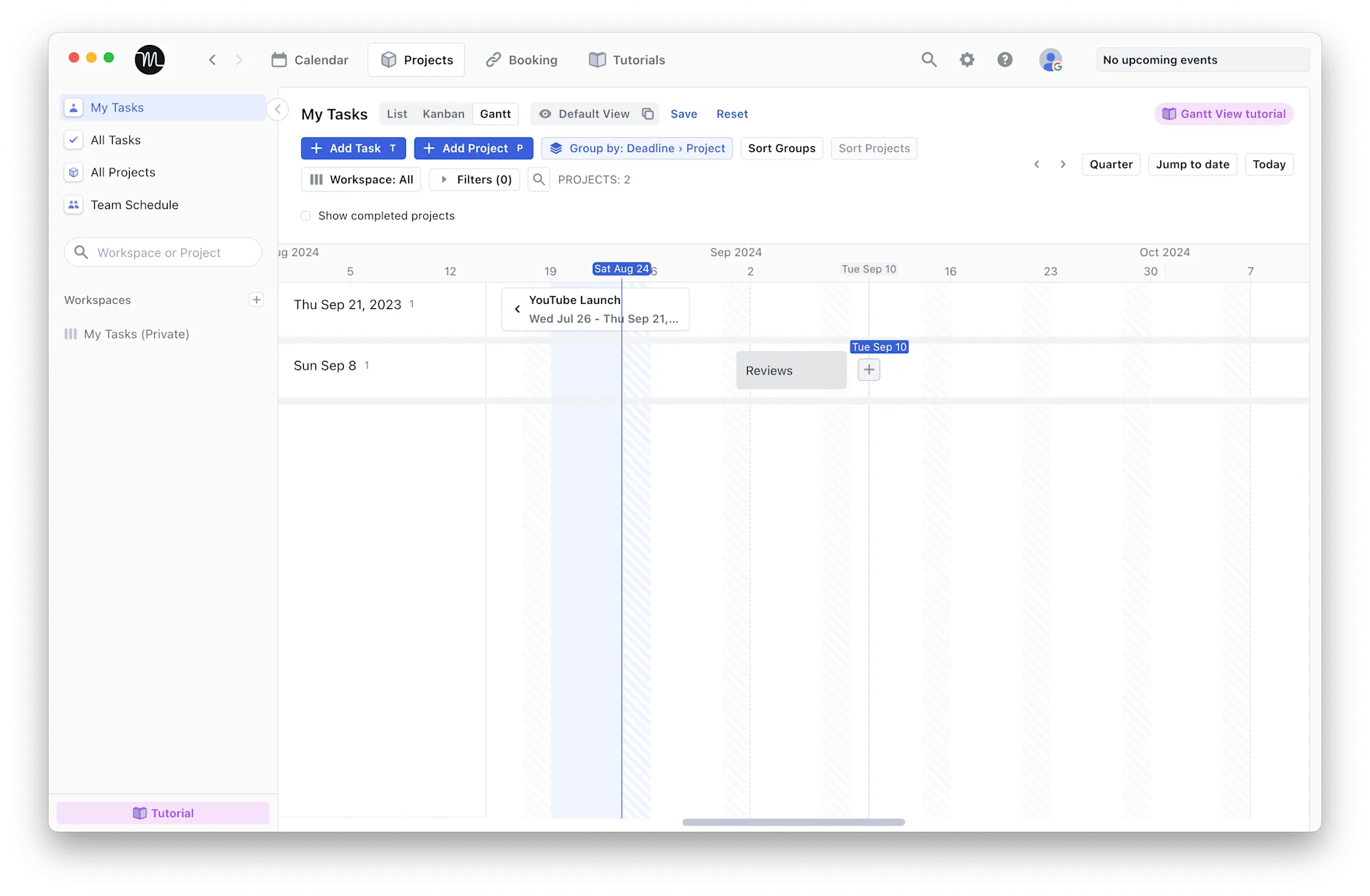
This is clear when you land on the "Projects" tab. You will find in Motion that the combination of views like Gantt is much more adapted for teams to collaborate within, maybe not a large team, but a smaller team that might want to use AI scheduling alongside projects.
Comparing Interfaces
How do Motion and Sunsama compare for day-to-day use:
Sunsama
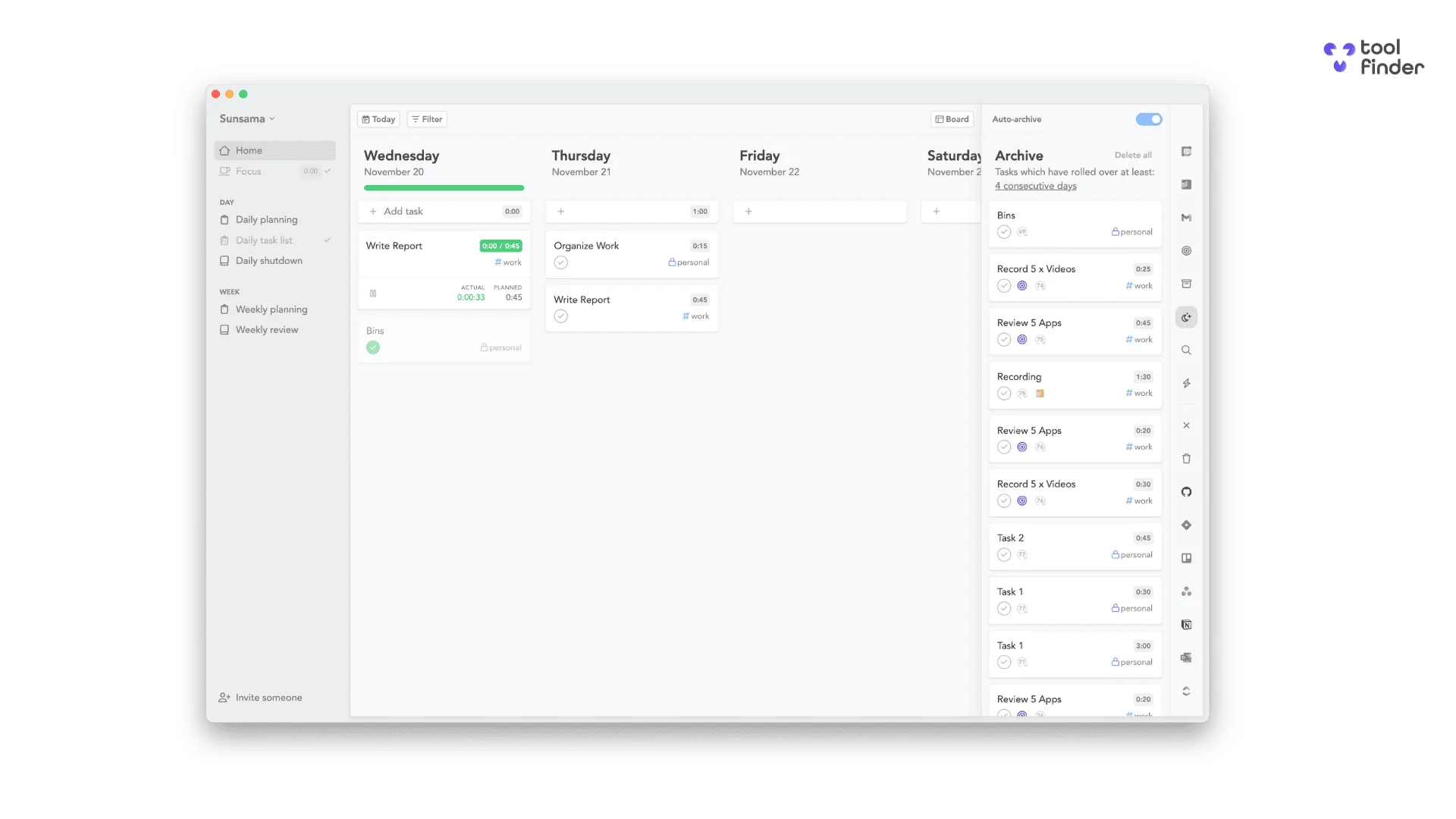
- Let's begin with Sunsama. The application allows you to manage your calendar and your tasks in one location. You can switch between a calendar view and a task management view, which is more of a Kanban-style upcoming week view, which is perfect for managing everything in one location in Sunsama.
- The primary focus is more mindfulness, allowing you to focus on not overloading your lists or your tasks for the day and focusing on those tasks at hand. They have a combination of features that allow you to do that by focusing on the task and trying not to overload yourself, like weekly objectives, focus mode, and guided planning, which helps you ritualize finishing your work day and starting your next one.
- This is different from the likes of Motion and in terms of interface and usability, Sunsama is approachable with a clean design but doesn't have a phenomenal mobile application, which is more of a reader-like experience
Motion
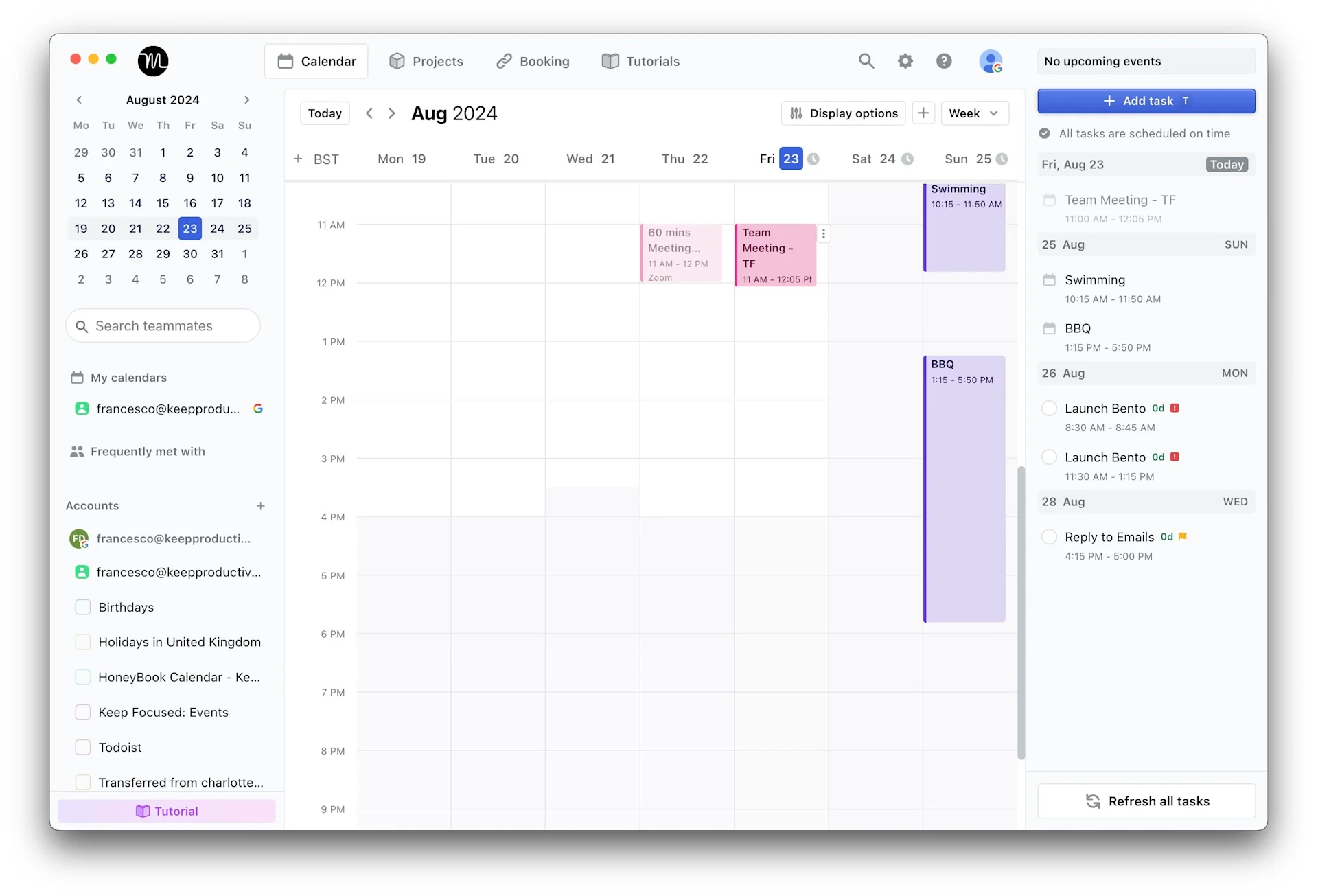
- On the other hand, Motion allows for a cleaner user interface. The calendar is the focus; users can jump to projects and tasks. A few different views help organize projects within the team.
- Largely, the calendar is the main element of this with a sidebar, which allows you to organize your tasks for the day ahead as well as drag them into your calendar. Motion also has a booking system that allows you to send out links and this allows.
- One of the better features inside of Motion is perfectly syncing with the AI, so it's well worth looking into how the interface utilizes artificial intelligence, like reorganizing your calendar and your tasks based on what the AI recommends based on your auto scheduling.
Comparing Daily Planning
Let's explore how these two compare when it comes to planning a day:
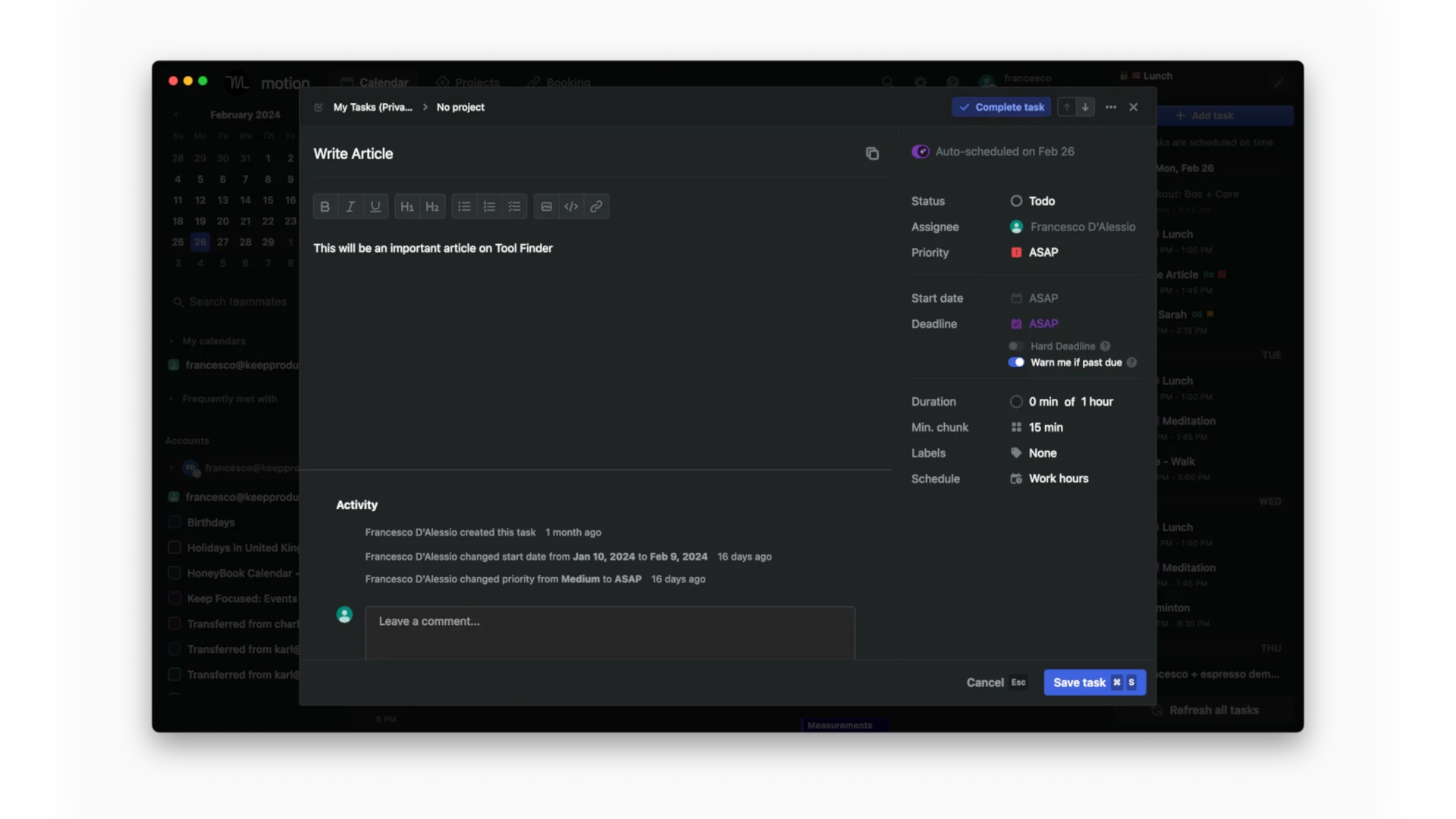
Motion
- Motion is a popular tool for daily planning. It allows you to schedule your week ahead using the calendar functions. Most importantly, it uses artificial intelligence to reorganize your tasks based on importance through auto-scheduling. This can be activated per task and is an excellent way to organize your tasks so they're more adaptive to the busy day ahead.
- For example, if something comes in that is much more important and the task is flexible or set to be scheduled, it will move that task around based on attributes like time of day, urgency, and other factors.
- This is a really helpful function that many people appreciate in Motion and utilize when planning their day. It's easy to switch between individual task mode and project management mode in Motion, which improves how you use the application to enhance your day-to-day productivity scheduling.
Sunsama

- Sunsama is a great tool for daily planning because it sets limitations for you. This addresses a common issue many people face: overloading their to-do list with too many tasks. Sunsama tackles this by setting a daily limitation and providing small indicators that notify you when you're overloading your to-do list.
- This function is seamlessly integrated into their scheduling, which is designed to help you plan your day effectively without overloading it. A standout feature is the "guided plan" instance, which encourages planning your day efficiently and not taking on too much.
- Additionally, there's a feature called "weekly objectives," which is quite beneficial. It allows you to zoom out from the immediate tasks at hand and focus on what you actually need to accomplish, allocating time per day in what seems to be a much faster way to plan your day ahead and even your entire week.
Comparing Project Management Abilities
For collaborating with others, how do Sunsama and Motion compare:
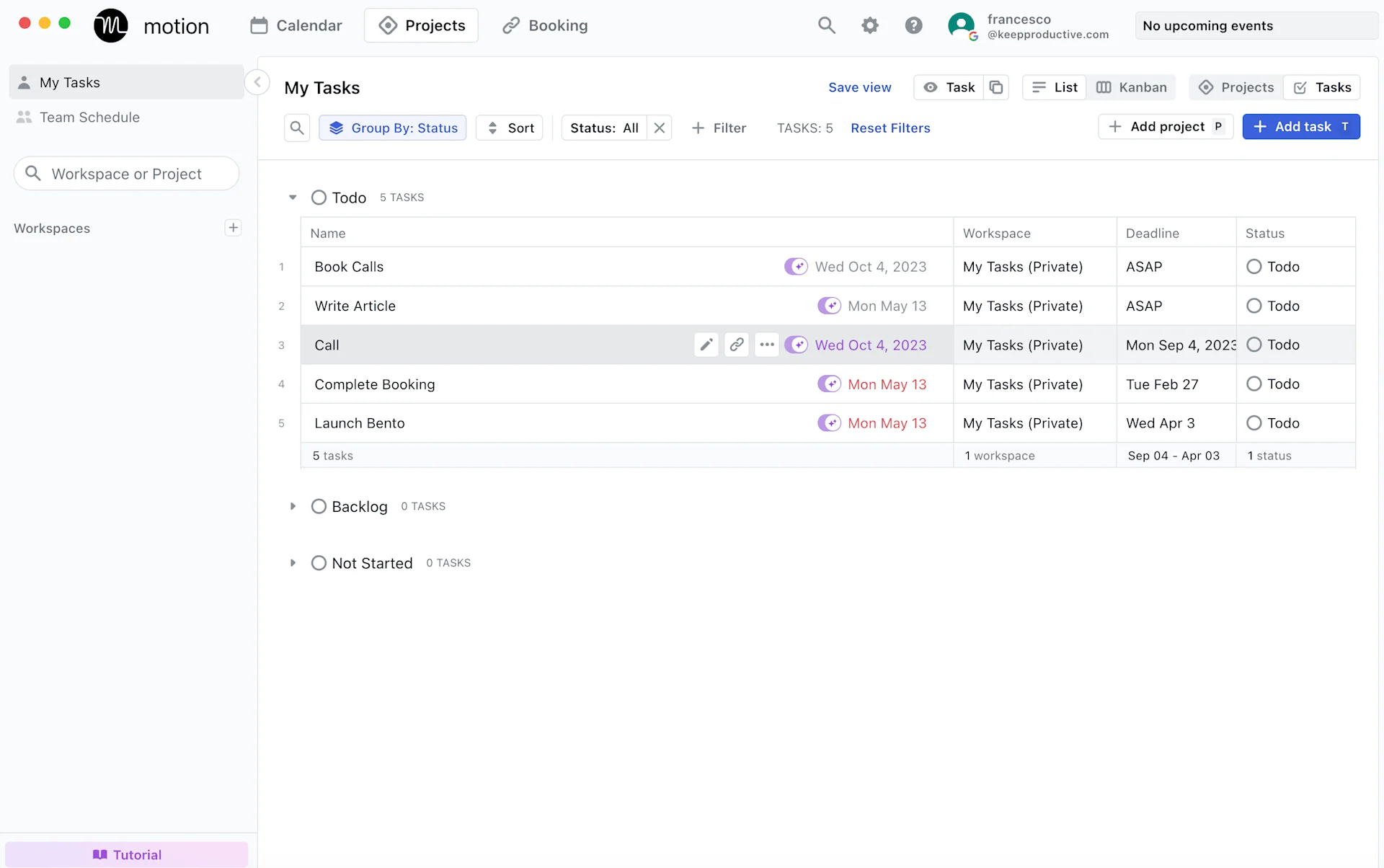
Motion
- Motion is equipped for project management within the application, allowing you to collaborate with others on projects through various views like Kanban and Table View. These features offer effective ways to organize your team, plan what's ahead, ensure everyone is focused on the same tasks, and assign responsibilities to team members.
- However, one of the major strengths of Motion is in the planning of your own time, especially when it comes to organizing teams. While you can assign tasks to others and collaborate on those tasks within the projects you've created, you also can organize your own day ahead.
- This aspect is particularly effective because many teams struggle to manage their own productivity, and Motion provides tools that help individuals focus on their personal time management as well as team-based project management.
Sunsama
- Sunsama does have some project management abilities, allowing you to assign tasks to other people within your existing Sunsama account; this is very much so because you can add people to different projects, which are essentially just organized areas for you and your team to collaborate.
- It isn't very complex in terms of what you can do with the wide variety of views compared with Motion. However, you do have the calendar and to-do view, which keep things simple. And, of course, with the task consolidation across multiple accounts, it is a much better way to bring tasks from other applications into the system and begin to assign them to other people as well so that the context is continued.
Sunsama and Motion Pro & Cons
This should give you a quick summarized version of the pros & cons:
Sunsama | Motion | |
|---|---|---|
Pros | Focused, Great for Guided Planning, Beautiful | AI Scheduling, Easy to Use, Project Management |
Cons | No AI Scheduling | Expensive Monthly |
Pros:
- The most powerful for mindful planning
- Easy-to-use planning experience
- Comes with task consolidation
- Brings a good quality app for tasks
Cons:
- Can be expensive for many
Pricing:
Sunsama comes at $16 per month, billed annually, or $20 per month, billed monthly. No free plan.
Motion App Pros
- Motion is a powerful task management system with AI-planning capabilities that will help you eliminate unnecessary productivity administration from your day.
- It is easy to look at and has a minimal design on both desktop and mobile, making it easy to use for managing tasks and projects.
- More attributes to tasks like sub-tasks, status, notes, deadlines, and more are needed for the most detailed task management.
- Good project management abilities for small teams, like Kanban and Gantt, and table views for plotting projects.
Motion App Cons
- Some people might not find the value in AI planning abilities.
- The complexity of adding details to each task that helps fuel the AI planning system might be too much for some people who want to time-block and manage tasks.
- Motion is an expensive tool that many people might break their budget.
Pricing Breakdowns
Let's take a look at how price makes and impact between these two:
How much does Sunsama cost per month?
Sunsama costs $20 per month or $16 per month billed annually.
Plans | Pricing |
|---|---|
Monthly | $20 per month |
Annual | $16 per month |
Is Sunsama Free?
Sunsama does not have a free plan outside of the 14-day trial.
How much does Motion app cost per month?
Motion is not free and has a few pricing models; they are the following:
Plans | Pricing (approx) | What's included? |
|---|---|---|
Individual Monthly | $34 per month | All-access features |
Team Monthly | $20 per month | Collaboration with others |
Individual Annually | $19 per month | All-access features |
Team Annually | $12 per month | Collaboration with others |
Is Motion app free?
Motion is not free but offers a 14-day free trial you can get here.
Sunsama vs Motion: Pricing Comparison
Sunsama and Motion are similar in pricing, but here's a short guide to help you:
- Sunsama has a monthly rate of $20 per month; this is good compared to the Motion pricing for $34 per month.
- Sunsama is also cheaper than Motion yearly, with yearly costs of $192 per annum versus the pricing of $228. It is not dramatically different, but it is still a month or two free compared to Motion.
- If you're worried about budget, Sunsama is cheaper.
- Motion packs in more power-thirsty features like AI that might demand the use of more resources.
Which To Pick: Sunsama or Motion?
Let's help you pick the one that matters most to you:
- Choosing between these two options, Motion and Sunsama, is an interesting one. I would probably typically recommend Sunsama more for those who are looking for more guided planning, task consolidation, and a daily plan-like application.
- While project management has some abilities, I wouldn't typically recommend it above Motion. However, Sunsama is a really good alternative if you're looking for something that's much more mindful, much more focused, and more of a generalized application with a little bit of AI sprinkled in there.
- Whereas Motion is probably better if you are on board with artificial intelligence, happy for it to reprioritize your task list, and also open to adding more people along the line in terms of other people you want to collaborate with. There are some good AI abilities; views are great, and it does have some project management systems too.
Our Final Recommendations
Here's what we'd recommend for you:
Best for Mindful Planning
Best for AI Scheduling
Recommended Reads
Similar to your current reading interests:
Oops, undefined is still in development...
Weekly Roundup: Explore People's Productivity Tools
Become a reader to our newsletter exploring what productivity apps people use on a daily basis to get things done